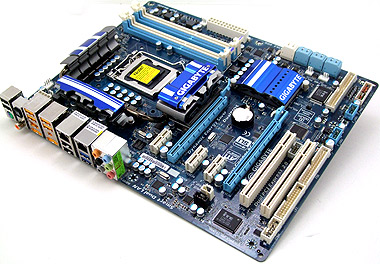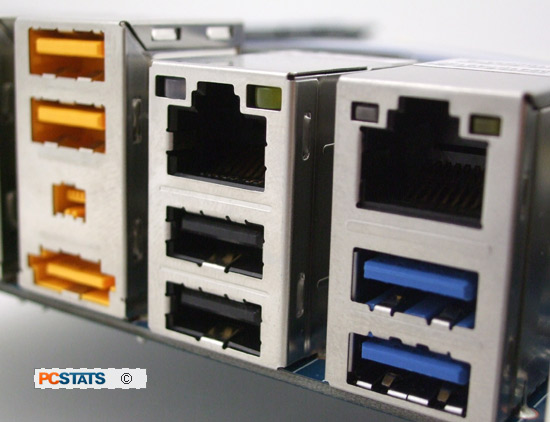
Gigabyte's GA-P55A-UD4P motherboard embraces
two major standards that are already important for PCs today, but will become
indispensible in the near future; USB3.0 and 6Gb/s SATA III.
SATA 6Gb/s is an important step forward for hard drive
connectivity that will improve bandwidth and transfer speeds, particularly with
new SSDs. With today's solid state drives approaching the limit of SATA 3Gb/s
connections, it's important to improve overall system bandwidth for the types of
burst reading and writing that makes top-end SSDs load programs and boot up so
quickly. Conventional SATAIII-compliant hard drives see a marginal difference in
moving to a faster bus.
In the next few years expect to see more SSDs entering
the market at much more affordable prices, and a common setup will become using
a fast SSD or two for running your OS and programs, while a larger conventional
hard drive stores media data like music and movies. Gigabyte's GA-P55A-UD4P
board is ready for this kind of setup, should you take the plunge in 2010
or even some years after.
The real killer feature included on the
Gigabyte GA-P55A-UD4P motherboard is SuperSpeed USB
3.0.
The most obvious application of USB 3.0's greater
bandwidth is externally connected mass storage devices like USB hard drive
enclosures, which can easily be bottlenecked with a USB 2.0 connection. USB 3.0
is fast enough that conventional hard drives will be able to transfer at full
speeds, so transferring a 25GB HD movie from your home computer to a USB 3.0
enabled external hard drive enclosure could theoretically take only 70 seconds
(versus 13.9 minutes for USB 2.0 or 9.3 hours for a USB 1.0 connection). Even
crazier devices are on the horizon, like USB-based secondary displays and HD
webcams.
 Let's put it
this way, I wouldn't buy a motherboard right now that didn't have a couple
USB3.0 ports onboard (or via PCI Express x1 card), but I could live without
6Gb/s SATA III.
Let's put it
this way, I wouldn't buy a motherboard right now that didn't have a couple
USB3.0 ports onboard (or via PCI Express x1 card), but I could live without
6Gb/s SATA III.
Gigabyte has rounded out the GA-P55A-UD4P's
feature set with enhanced USB electrical capacity; USB2.0 ports deliver as
much as 1500mA and the boards USB3.0 ports up to 2700mA. In real world language
that means more external hard drives and power sucking USB devices can be
connected to a single USB port without needing secondary USB
ports just to supply the juice to keep those external devices
running.
Electrically speaking, all the USB ports on the
GA-P55A-UD4P are now individually fused to protect the rest of the system from
shorts. I once killed my entire desktop system with a bogus USB device
that went in at an angle and shorted out the USB slot... in the process it
killed the CPU, optical drives, motherboard and RAM.
The remainder of the Gigabyte's GA-P55A-UD4P platform
meets expectations for a upper-mainstream board based on the Intel P55
Express chipset. Both SLI and Crossfire are supported so it's suitable for
gaming, it has a load of SATA ports for storage (two 6Gb/s SATA III, six
3Gb/s SATA II and two eSATA 3Gb/s), as well as an extensive list of I/O
connections like dual Gigabit LAN, dual 1394a Firewire ports, optical and
coaxial audio output and of course USB 3.0 ports.
Benchmark performance is exactly where you'd expect itto
be from a P55 Express motherboard, which is to say entirely average.
We comfortably overclocked the BCLK of the test Core i5 processor from
133MHz up to 210MHz, the same limit as most of the socket 1156 motherboards that
PCSTATS has tested so far.
If you were waiting for the second generation of
motherboards based on Intel's P55 Express chipset to show up, wait no longer.
The Gigabyte GA-P55A-UD4P board combines some cutting edge features
(repeat after me USB 3!) with excellent stability and build quality, and at
$210 CDN ($190 USD, £125 GBP) it's got the value
nailed down too. Recommended.

Related Articles
Here are a few other articles that you might enjoy as
well...
- ASUS M4A78T-E AMD 790GX Socket AM3 Motherboard Review
- ASUS Striker II NSE nVidia nForce 790i SLI Motherboard
Review
- ASUS M3A78-T AMD 790GX Socket AM2+ Motherboard
Review
- ASUS P5E3 Premium/Wifi-AP.N Intel X48 Express Motherboard
Review
- Gigabyte GA-X48-DS5 Intel X48 Express Motherboard
Review
- Asus P5Q-EM Intel G45 Express Motherboard
Review
